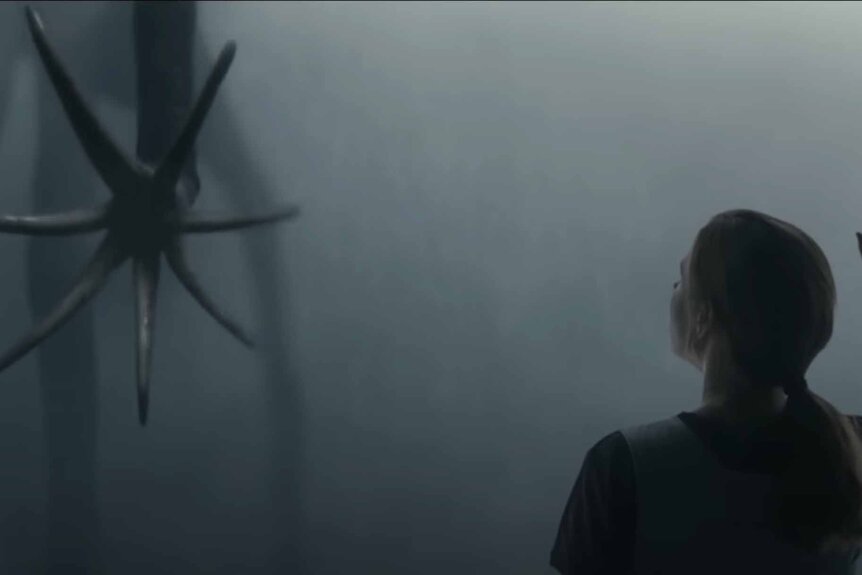Create a free profile to get unlimited access to exclusive videos, sweepstakes, and more!
Arrival: Revisiting Denis Villeneuve’s Most Emotional Film
Within the Dune director's impressive genre CV, Arrival stands out as his most emotionally impactful film.

When you look at Denis Villeneuve's cinematic resume, it's a little jarring to comprehend that he's only directed 11 theatrical films. Seven of those are thrillers, with his last four films — Arrival, Blade Runner 2049, Dune and Dune: Part Two — critically ranking amongst some of the very best sci-fi films to hit cinemas in the last decade.
His genre work in particular has earned him the reputation as a world-class visualist, with his sci-fi films pushing the boundaries of imagination of scale and scope with what he brings to life. Be it novelist Frank Herbert's sand worms, the next iteration of Ridley's Scott's idea of futuristic society, or what first-contact with aliens might look, Villeneuve's eye is both breathtaking and memorable. Yet with 2016's Arrival (now streaming on Peacock), the director arguably pulls off both the spectacle and the heart in a way he's never done before on screen.
For More on Arrival and First Contact:
If you liked the science in the movie Arrival, I want to have a (single) word with you
Arrival - A not really Bad Astronomy review
How could we communicate with aliens? The science behind 'Close Encounters'
What makes Arrival a singular piece on Denis Villeneuve's theatrical resume?
Arrival is based on science fiction author Ted Chiang's short story, Story of Your Life (1998). Screenwriter Eric Heisserer and Villeneuve took the foundation of the short story and extrapolated a more complex, non-linear, sci-fi narrative centering on the life and work of Linguist Louise Banks (Amy Adams). Using the framing device of the world making first contact with extraterrestrials who come to Earth, Arrival uses language as the basis to explore how humans use it to communicate with "heptapods," and how language can fail humans when it comes to expressing the depth of emotions that we have within us: be it love, grief, or profound sadness.
On one hand, Arrival is another visual epic
As with all of Villeneuve's films, be they thrillers or science fiction, Arrival is visually arresting. At first, the director lays the film out as a mystery about whether humanity and extraterrestrials can bridge the communication gap. Playing out like a more granular Close Encounters of the Third Kind, the audience thinks they're watching a film about this one thing.
In both the short story and the film, the aliens are described as a cephalopod-like species who possess a 3D-like language that for humans can alter their linear perception of time. Through more than half of Arrival, Banks and her colleagues from around the world treat their interactions with the aliens like a cipher to be puzzled, literally, out of the ether.
The "heptapods" are realized as chiaroscuro creatures that exist in a grey-like gloom but "speak" in bold, inky spheres and rings that have to be deciphered to ensure their safety with the more nervous nations around the globe. Villeneuve uses adept use of pacing and thriller angst to achieve that proverbial "ticking clock" aspect to the challenge presented to Banks and her equally inquisitive science, linguist, and mathematician peers, and that alone would be enough for an engrossing film. But then Heisserer and Villeneuve make it personal.
The extraordinary journey of Arrival's Louise Banks
If there's any criticism of Villeneuve's sci-fi and fantasy films, it's that his visuals sometimes overwhelm the human stories that are central to his stories. But Arrival has no such issue, as both critics and audiences found that the more pragmatic, thriller aspects of the film were extremely well balanced because Adams' Banks remained central to the film from beginning to end. Introduced in one capacity as a curious linguist assigned to help crack the alien language, Banks ascends quickly in importance to become the primary interpreter between the aliens and humanity.
As more of the alien's language is learned over time, Banks becomes changed. And the root of that change is tied to some incredibly heady conceptual theories that without the right refinement could make the film turn cold. However, the script, direction, and performance stay focused on keeping Banks' emotional journey central. As the more challenging non-linear aspects kick in towards the last act, Arrival never devolves into a theory-centric, science-first film.
In fact, when Bank's perceptions shift and Adam's performance becomes more interior and distanced, those are cues that become part of the evolving puzzle. Then, as she moves towards answers, they become more monumental and emotional, not on a galactic scale, but on the most intimate scale one could imagine. The price for her passion for this otherworldly pursuit is rewarded with an awful knowledge that forces her — and us — to seek answers that go to the very core of our humanity, in assessing what makes our existence worth living.
While Villeneuve hits an incredibly stark, emotional climax with Prisoners and Sicario, and exceptional reveals with emotional payoffs in Blade Runner 2049, Arrival achieves a masterful balance of brain and heart that packs a breathtaking punch when everything gets stitched together for the audience to take into account and process. It's also the film that arguably stays with you in your soul longest after the fade to black.
Arrival and other incredible sci-fi classics are available to watch now on Peacock.



























